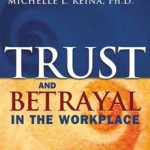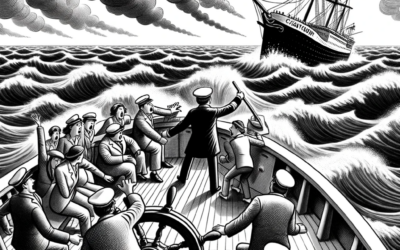Continued interview with Dennis & Michelle Reina about trust in the workplace. Part 1.
What has been your favorite assignment in helping an organization to enhance their ability to trust?
We enjoy working with committed leaders over time that recognize the value of trust in workplace relationships and the importance of building trust within their organizations to produce business results. (We don’t just build trust for the sake of building trust. Having more trust can support every key organizational initiative in being successful.) Supporting these aware leaders to build, rebuild and transform trust makes a difference with their employees; between employees and with the customers and stakeholders they serve.
What are the key symptoms that you look for in an organization to know that there is a low level of trust?
We utilize our statistically valid and reliable measuring instruments to diagnose the level of trust at the organizational, team and leader levels and pinpoint the key symptoms. Often we get called in to work with a leader and their organization because ‘trust scores’ on their organizational culture or employee satisfaction surveys are low and have been declining over a number of years.
The Reina Trust Building instruments are developed after years of research and are based on the Reina Trust & Betrayal Model®. The questions on each of the surveys that load to the each of the 16 behaviors that builds Transactional Trust.
I mention again “statistically valid and reliable” measuring instruments because it takes years of research to develop a psychometrically sound instrument. There’s been a proliferation of books, as well as surveys to measure trust- but they are not rigorously tested or psychometrically sound. Each of our instruments has gone through rigorous psychometric testing and retesting over the last 17 years. Most of our instruments are on their fourth generation of revision.
What personal experience did you have that informed your work in the area of trust?
We teach what we want to learn. Initially, Michelle and I each came to this work from our experiences in our personal lives. For example, I (Dennis) am a survivor of two bouts with cancer, a near death accident, a traumatic injury and shingles and a painful divorce many years ago. I was faced with trust breaking circumstances; I had to learn the hard lessons behind the experiences. In doing so, I was able to reframe the experiences and take responsibility. Much of those experiences have informed our work in building, rebuilding trust and healing and renewal.
Professionally, Michelle and I came to this work because we saw the need early on in our work with leaders and their client organizations. We saw that the success or failure of any key business initiative or change process predicated on the level of trust within the organization- leader with leaders, leader with employees, employees with employees.
How do issues around trust in the workplace block people asking questions?
Fear: lack of safety, fear of retribution or retaliation. When there is low trust in a relationship or within a team or an organization, people are reluctant to share information, ask questions or take risks because they feel vulnerable. People contract and withhold thoughts because they do not feel safe. They act in self-serving versus mutually serving ways. Distrust is created on all sides. Distrust creates distrust, which can lead to betrayal. Betrayal creates more betrayal- it is a downward spiral.
What questions do you ask your clients to explore these issue ?
What evidence is showing up within your team or organization that give you indications that trust is low or vulnerable?
Where in your team or organization is trust strong? Where is it low or vulnerable?
What is the business case for trust? (Given that trust supports achieving business objectives)
How would having more trust support your team or organization achieving its business goals or initiatives?
What support do you need to build, rebuild or renew trust within you, your team or your organization, board or stakeholders or customers?
What ideas would really surprise people to know about trust in the workplace?
Some people are surprised when we mention that betrayal is a natural element of the human condition. Because we are human, we all have a shadow side. Given our busy, trying-to-do-more-with-less (usually too much) schedules, workloads and life styles, we trip up, inadvertently causing disappointment, hurt, and pain to others. We betray others and we betray ourselves.
The ‘work’ we each have to do is become more aware of ourselves and others. In doing so, we still may trip up and hurt others; that probably won’t stop. But knowing how to effectively handle our misgivings, and transgressions are essential. Knowing how to rebuild trust again and again and again is essential to building sustainable trust. It is essential to renewing confidence, commitment and energy with those with whom we work and serve and those with whom we live with and love.
Related blog posts:
- Building Trust in Your Organization
- Three Ways to Trust & More
- 90% of Employees Feel Betrayal Frequently
- 5 Questions to Ask to Build Trust
Leadership Style Assessment – What style are you?



